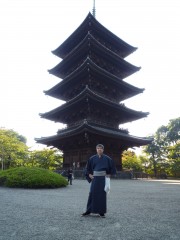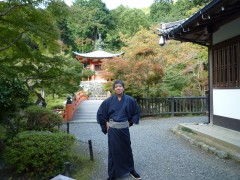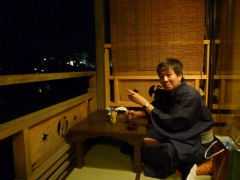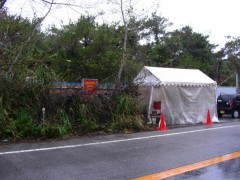09 January 2013
Why not visit Nozawa Onsen Ski and natural hot spring village?
In the beginning of this year, I went to Nozawa Onsen village in Nagano Prefecture.
The below is last year's footage, February 2012.
It is famous ski resort but it is also famous for natural hot spring town. The word, Onsen means natural hot spring in Japanese.
Interestingly enough, the town is not only famous for Japanese skiers but Australians, New Zealanders and other foreigners. A ski resort famous for foreigners I knew was Niseko in Hokkaido. I visited there two years ago. Then I learnt Australians there became more interested in Nozawa Onsen. That was why I visited Nozawa last year and this year.
The place was better than expected. Snow quality was great. The courses were varied. I saw many Australians and other foreigners skiing and snowboarding. Not as many as number I saw in Niseko but I could meet some Aussies every time I got on a lift. I even could meet them attending ski school which only provided Japanese intruction. They told me they learnt it by body language. Wow!!
I saw them outside the ski areas. That is public bath houses. There are 13 community bath houses in the village. It is open early in the morning until late at night. All of them were managed by localies and free of charge for anybody including tourists. The hot water comes from volcano line underneath the village. It smells sulfur and some of them were really hot. I could not imagine foreigners enjoying that. But I saw them quite frequently.
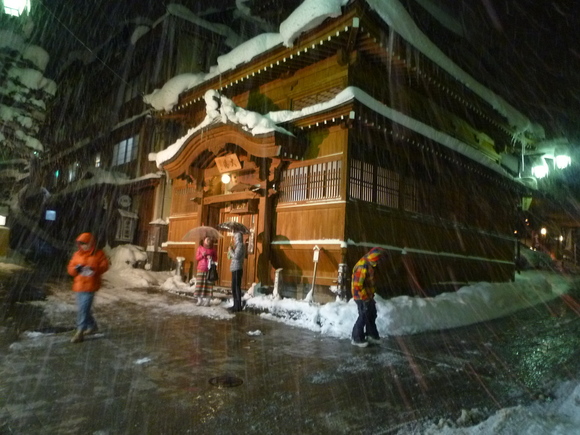
I spoke with localies. They told me they actually made sales to Australians flying there. However, they never change their village to resort style. They keep the way they have been from the past. You can't find any big hotels and leisure facilities over there. Just small local hotels, bath houses, temples, shrines, small shops, restaurants and bars. No big places except ski slopes. Very much like Japanese traditional village.
Localies seems to be proud of keeping their originality and personality. When I bathed in a community bath, one local man scolded a young boy saying "wash your penis before you get into the bath tub." That means keep the bath clean and respect the manners.
It is a very mystique place. Real winter wonderland!
17:30 Posted in Australia, Culture, Health, Japan News, Leisure, Society, Sports, Travel | Permalink | Comments (0) | Tags: ski, snow, hot spring
25 October 2012
Visited Miyako wearing Kimono
Last weekend I went to Kyoto city which was called Miyako in famous Hollywood Geisha film "Memoirs of a Geisha."
I visited there a few times in the past. But this time was kind of new experience because I wore kimono all the time during my trip.
Do you know what kimono literaly means in Japanese? It means "thing to wear." Yes, that simply means "cloth." In the old days everyone wore it in everyday life. Now people wear it occasionally only for special events such as New Year's day, coming of age or wedding ceremony. Most of us do not wear it casually. Even in Kyoto, you could rarely see people in kimono.
That should be considered very dissapointing, isn't it. That is why I decided to wear in Kyoto. Not just for special event. I did it all the time during the trip including the time I am staying at hotel and using transportation such as bus and subway. I impressed not only foreign tourists but Japanese there.
In Kyoto I visited the Geisha towns, Budhist temples and shrines. I could enjoy viewing those places in a very different way because of kimono. Kimono restrains you and makes you walk difficult. Not just kimono, I wore Japanese tradtional socks, called Tabi and sandals, called Zori. Those things disturbed me as well.
But that is why I had different experience from the past trips. I experienced how people viewed the places when the places was first established. I could share experience with people in the old eras.
Japanese lifestyle has dratiscally changed since Japan opened door to the West. We seemed lost our identity by that. Wearing kimono can revive our lost identity and traditional feeling.
See the photo of the below. That is traditional way of enjoying meals and sake. I did it on balcony of riverside restaurant. I enjoyed nice view as well as tasty sake and delicous Kyoto cuisine.
Kimono and Kyoto are what we should be proud of.
03 March 2011
Japan's repression to the small island residents by constructing nuke plants
Last weekend I visited most weird beach in the world. That is in Kaminoseki town, Yamaguchi prefecture.
It is said to be the construction site for newly built nuclear power plant that is scheduled to start operation in 2018.
See this video.
This is what it was like. The beach is watched by construction workers and security guards but people set up tents and held music concerts like enjoying party. Although annoucement that says "This is construction area. Please leave here immediately" was made every hour, they never moved. I joined them. They are activists who protest ongoing construction of nuclear power plant in Kaminoseki.
If the plant is constructed there, people living on nearby island called Iwai-shima should have very harsh life. Not just fear of radioactive leaking but the sea being polluted by warm water released from the plant, which kills fish they hunt for living.
They occupy the beach to show objection to the construction. They also sail to the sea where construction ships are anchored. Using fishery ships and kayaks, they try to stop the construction of the plant.
Nuclear plant is out of date power generation. The cost efficiency is lowering and renewable energey has become more common around the world.
Nuke plants have now become like US military bases in Japan. Both do not function as people expect to do. However myth that these things are very functional is still common.
A few weeks ago I joined the protest march to the U.S. embassy in Tokyo to show objection to construction of U.S. marine helipads in Takae, Okinawa. Two people were arrested by the police near the embassy.
23:58 Posted in Japan News, Leisure, Politics, Science, Society, Travel | Permalink | Comments (0) | Tags: nuclear power
11 February 2011
Touched by Okinawans' Libertarianism
I went to Okinawa last month to help the localies protest against construction of new U.S. military bases on their island. I visited two sites. One is Henoko, where US marine's runways is planned to be constructed by reclaiming the coral reef ocean where endangered mammals, dugongs inhabit.
The other one is Takae, where the U.S. marine's helicopter pads are under construction in the mountain. The helicopters or ospreys will be deployed. They are very much concerned about big noises and accident caused by those.
In both sites, localies set up tents to monitor what construction workers do and do protest activities in order to stop or delay the construction. They say they do not care what the government decides because they can decide what to do within their communities. I saw a local man stopping cars passing by including those belonging to the US marine. They had guts to protect their community. Some of them are even accused of blocking the road by the authority. But they still keep on doing what they do.
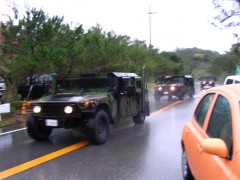
Ironically, this reminds me of what I learnt during my college days in the U.S. I think this is American way of doing democracy. If a citizen thinks his or her own government is doing wrong, right the wrong even by breaking the law. Like Rosa Parks' refusing to give front seat in the bus to white passenger which led to boycott on the commute buses by Afro-Americans and end up growing civil rights act movement.
The Japanese government and the U.S. marine is doing the wrong thing because they do the projects without approval from the localies.
It is also called "Libertarianism" which respects individuals' freedom not being intervened by the authority. That is why they protest gun control and public medical insurance offering. They want to minimize the government's restriction on individuals' lives. Their first priority is individualism and their most important community is their local town, not central governemnt. That is how the United States of America is constructed.
That means Okinawans' localies have the right to protest and overthrow the plans which the two big governments decide. Furthermore, Libertarians think such government should be overthrown by militias.
19:16 Posted in Japan News, Politics, Society, Travel, US-Japan relationship, USA issues | Permalink | Comments (0) | Tags: military, okinawa






